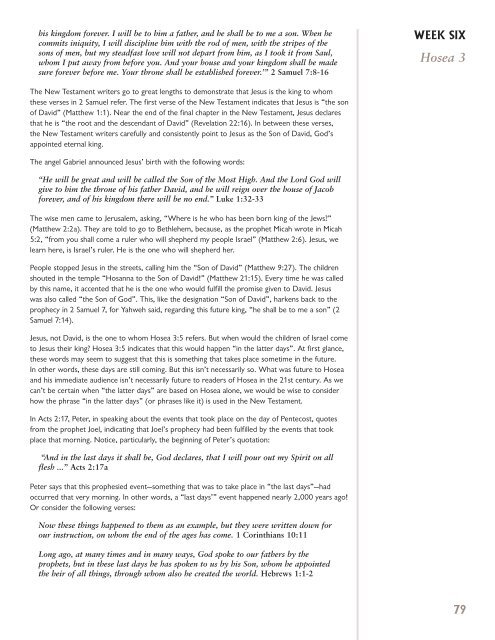Create successful ePaper yourself
Turn your PDF publications into a flip-book with our unique Google optimized e-Paper software.
his kingdom forever. I will be <strong>to</strong> him a fa<strong>the</strong>r, and he shall be <strong>to</strong> me a son. When he<br />
commits iniquity, I will discipline him with <strong>the</strong> rod of men, with <strong>the</strong> stripes of <strong>the</strong><br />
sons of men, but my steadfast love will not depart from him, as I <strong>to</strong>ok it from Saul,<br />
whom I put away from before you. And your house and your kingdom shall be made<br />
sure forever before me. Your throne shall be established forever.’” 2 Samuel 7:8-16<br />
The New Testament writers go <strong>to</strong> great lengths <strong>to</strong> demonstrate that Jesus is <strong>the</strong> king <strong>to</strong> whom<br />
<strong>the</strong>se verses in 2 Samuel refer. The first verse of <strong>the</strong> New Testament indicates that Jesus is “<strong>the</strong> son<br />
of David” (Mat<strong>the</strong>w 1:1). Near <strong>the</strong> end of <strong>the</strong> final chapter in <strong>the</strong> New Testament, Jesus declares<br />
that he is “<strong>the</strong> root and <strong>the</strong> descendant of David” (Revelation 22:16). In between <strong>the</strong>se verses,<br />
<strong>the</strong> New Testament writers carefully and consistently point <strong>to</strong> Jesus as <strong>the</strong> Son of David, God’s<br />
appointed eternal king.<br />
The angel Gabriel announced Jesus’ birth with <strong>the</strong> following words:<br />
“He will be great and will be called <strong>the</strong> Son of <strong>the</strong> Most High. And <strong>the</strong> Lord God will<br />
give <strong>to</strong> him <strong>the</strong> throne of his fa<strong>the</strong>r David, and he will reign over <strong>the</strong> house of Jacob<br />
forever, and of his kingdom <strong>the</strong>re will be no end.” Luke 1:32-33<br />
The wise men came <strong>to</strong> Jerusalem, asking, “Where is he who has been born king of <strong>the</strong> Jews?”<br />
(Mat<strong>the</strong>w 2:2a). They are <strong>to</strong>ld <strong>to</strong> go <strong>to</strong> Bethlehem, because, as <strong>the</strong> prophet Micah wrote in Micah<br />
5:2, “from you shall come a ruler who will shepherd my people Israel” (Mat<strong>the</strong>w 2:6). Jesus, we<br />
learn here, is Israel’s ruler. He is <strong>the</strong> one who will shepherd her.<br />
People s<strong>to</strong>pped Jesus in <strong>the</strong> streets, calling him <strong>the</strong> “Son of David” (Mat<strong>the</strong>w 9:27). The children<br />
shouted in <strong>the</strong> temple “Hosanna <strong>to</strong> <strong>the</strong> Son of David!” (Mat<strong>the</strong>w 21:15). Every time he was called<br />
by this name, it accented that he is <strong>the</strong> one who would fulfill <strong>the</strong> promise given <strong>to</strong> David. Jesus<br />
was also called “<strong>the</strong> Son of God”. <strong>This</strong>, like <strong>the</strong> designation “Son of David”, harkens back <strong>to</strong> <strong>the</strong><br />
prophecy in 2 Samuel 7, for Yahweh said, regarding this future king, “he shall be <strong>to</strong> me a son” (2<br />
Samuel 7:14).<br />
Jesus, not David, is <strong>the</strong> one <strong>to</strong> whom Hosea 3:5 refers. But when would <strong>the</strong> children of Israel come<br />
<strong>to</strong> Jesus <strong>the</strong>ir king? Hosea 3:5 indicates that this would happen “in <strong>the</strong> latter days”. At first glance,<br />
<strong>the</strong>se words may seem <strong>to</strong> suggest that this is something that takes place sometime in <strong>the</strong> future.<br />
In o<strong>the</strong>r words, <strong>the</strong>se days are still coming. But this isn’t necessarily so. What was future <strong>to</strong> Hosea<br />
and his immediate audience isn’t necessarily future <strong>to</strong> readers of Hosea in <strong>the</strong> 21st century. As we<br />
can’t be certain when “<strong>the</strong> latter days” are based on Hosea alone, we would be wise <strong>to</strong> consider<br />
how <strong>the</strong> phrase “in <strong>the</strong> latter days” (or phrases like it) is used in <strong>the</strong> New Testament.<br />
In Acts 2:17, Peter, in speaking about <strong>the</strong> events that <strong>to</strong>ok place on <strong>the</strong> day of Pentecost, quotes<br />
from <strong>the</strong> prophet Joel, indicating that Joel’s prophecy had been fulfilled by <strong>the</strong> events that <strong>to</strong>ok<br />
place that morning. Notice, particularly, <strong>the</strong> beginning of Peter’s quotation:<br />
“And in <strong>the</strong> last days it shall be, God declares, that I will pour out my Spirit on all<br />
flesh ...” Acts 2:17a<br />
Peter says that this prophesied event—something that was <strong>to</strong> take place in “<strong>the</strong> last days”—had<br />
occurred that very morning. In o<strong>the</strong>r words, a “last days’” event happened nearly 2,000 years ago!<br />
Or consider <strong>the</strong> following verses:<br />
Now <strong>the</strong>se things happened <strong>to</strong> <strong>the</strong>m as an example, but <strong>the</strong>y were written down for<br />
our instruction, on whom <strong>the</strong> end of <strong>the</strong> ages has come. 1 Corinthians 10:11<br />
Long ago, at many times and in many ways, God spoke <strong>to</strong> our fa<strong>the</strong>rs by <strong>the</strong><br />
prophets, but in <strong>the</strong>se last days he has spoken <strong>to</strong> us by his Son, whom he appointed<br />
<strong>the</strong> heir of all things, through whom also he created <strong>the</strong> world. Hebrews 1:1-2<br />
WeeK six<br />
Hosea 3<br />
79



